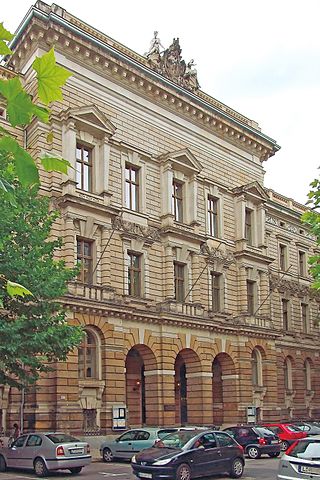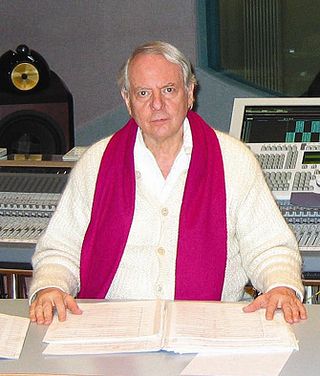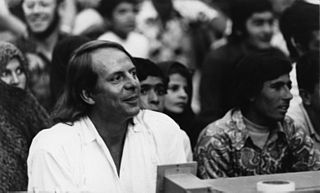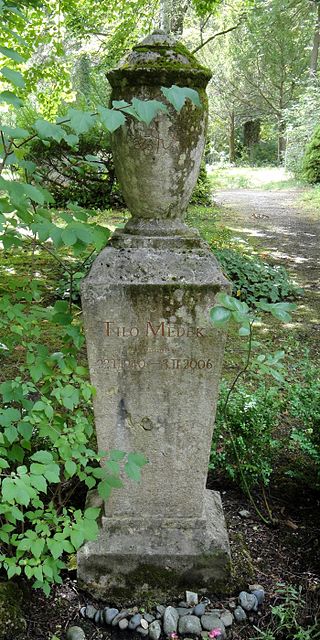Michael Reudenbach (born 13 September 1956) is a German composer. He performs as an interpreter of Early and New Music. [1]
Michael Reudenbach (born 13 September 1956) is a German composer. He performs as an interpreter of Early and New Music. [1]
Reudenbach was born in Aachen. After training as a church musician from 1976 to 1982, Reudenbach studied musical composition from 1986 with Joachim Blume in Cologne and Denis Cohen in Paris. In 1984 he took part in interpretation courses with Philippe Herreweghe. In 1990/1991 he attended composition courses with Helmut Lachenmann and Mathias Spahlinger.
He has been teaching music theory, musical analysis and hearing training at the Katholische Hochschule für Kirchenmusik St. Gregorius (1982-1999) and at the Hochschule für Musik Karlsruhe (1999-2016), musical composition at the Solitude Summer Academy in Stuttgart (2005), at the Darmstädter Ferienkurse (2006) and at the conservatories of Dresden and Stuttgart (substitute professorships between 2012 and 2015). Since the winter semester 2016 he has been Professor of Composition/Music Theory at the Frankfurt University of Music and Performing Arts.
Reudenbach received prizes and scholarships from the Akademie Schloss Solitude and the Heinrich-Strobel-Stiftung of the Südwestrundfunk among other.

Isang Yun, also spelled Yun I-sang, was a Korean-born composer who made his later career in West Germany.

The University of Music and Theatre "Felix Mendelssohn Bartholdy" Leipzig (German: Hochschule für Musik und Theater "Felix Mendelssohn Bartholdy" Leipzig) is a public university in Leipzig (Saxony, Germany). Founded in 1843 by Felix Mendelssohn as the Conservatorium der Musik (Conservatory of Music), it is the oldest university school of music in Germany.

Licht (Light), subtitled "Die sieben Tage der Woche", is a cycle of seven operas composed by Karlheinz Stockhausen between 1977 and 2003. The composer described the work as an "eternal spiral" because "there is neither end nor beginning to the week." Licht consists of 29 hours of music.
Michael Denhoff is a German composer and cellist.

Tierkreis (1974–75) is a musical composition by the German composer Karlheinz Stockhausen. The title is the German word for Zodiac, and the composition consists of twelve melodies, each representing one sign of the zodiac.
Nicolaus A. Huber is a German composer.

Georg Friedrich Haas is an Austrian composer. In a 2017 Classic Voice poll of the greatest works of art music since 2000, pieces by Haas received the most votes (49), and his composition in vain (2000) topped the list.
Jörn Arnecke is a German composer. Arnecke is the professor of music theory, aural training, and historical music theory at the Hochschule für Musik Franz Liszt, Weimar.

Dienstag aus Licht is an opera by Karlheinz Stockhausen in a greeting and two acts, with a farewell, and was the fourth of seven to be completed for the opera cycle Licht: Die sieben Tage der Woche. It was begun in 1977 and completed from 1988 to 1991, to a libretto by the composer.
Iris ter Schiphorst is a German composer and musician.
Nélida Béjar is a Spanish composer based in Germany. She studied Music at the Hochschule für Musik und Theater München and Composition with Wilfried Hiller at Richard Strauss Conservatory in Munich. In 2012 she received a PhD in Composition at Trinity College, Dublin, where she studied with Donnacha Dennehy.

Für kommende Zeiten is a collection of seventeen text compositions by Karlheinz Stockhausen, composed between August 1968 and July 1970. It is a successor to the similar collection titled Aus den sieben Tagen, written in 1968. These compositions are characterized as "Intuitive music"—music produced primarily from the intuition rather than the intellect of the performer(s). It is work number 33 in Stockhausen's catalog of works, and the collection is dedicated to the composer's son Markus.

Tilo Medek, originally Müller-Medek, was a German classical composer, musicologist and music publisher. He grew up in East Germany, but was inspired by the Darmstädter Ferienkurse. He composed radio plays and incidental music. His setting of Lenin's Decree on Peace led to restrictions, and after he showed solidarity with the expatriated Wolf Biermann, he also had to move to the West, where he composed an opera Katharina Blum based on Heinrich Böll's novel, and worked in education. He received international awards from 1967 onwards.
Jörg Herchet is a German composer.
Rolf Riehm is a German composer who wrote stage and orchestral works as well as music for ensembles and solo instruments. He began as an oboist and music teacher and was later a professor of music theory at the Hochschule für Musik und Darstellende Kunst Frankfurt am Main for several years.
Christoph von Blumröder is a German musicologist.
Wilfried Krätzschmar is a German composer.
Hans-Christian von Dadelsen is a German composer and music writer. He is the son of the musicologist Georg von Dadelsen and the journalist Dorothee von Dadelsen.
Mathias Spahlinger is a German composer. His work takes place in a field of tension between the most diverse musical influences and styles: between Renaissance music and Jazz, between musique concrète and Webernian minimalism, between noise, improvisation and notation, between aesthetic autonomy and political consciousness, Spahlinger's works carry out conflicts for which there are no fixed models.
Péter Kőszeghy is a Hungarian composer and music eductor.